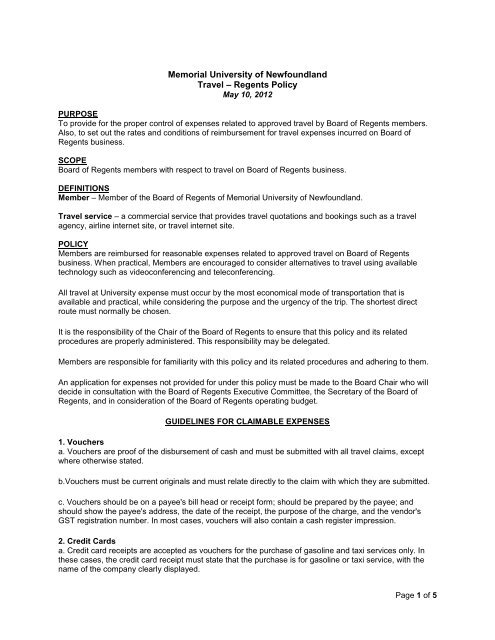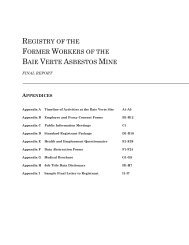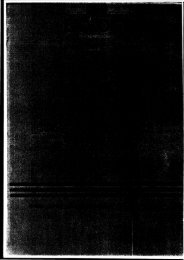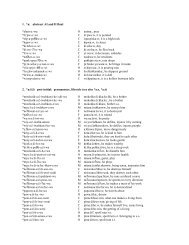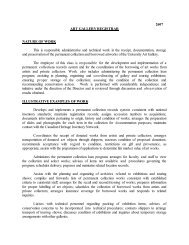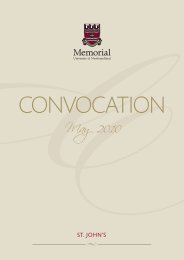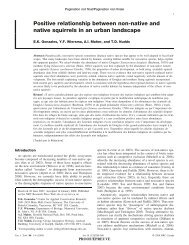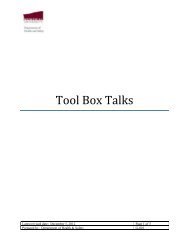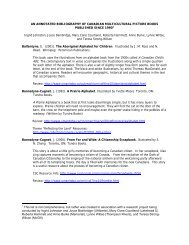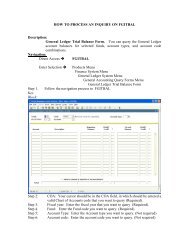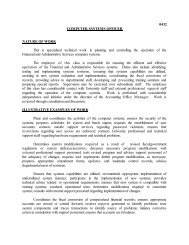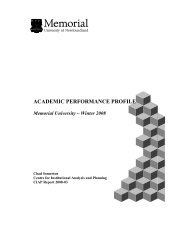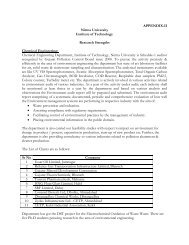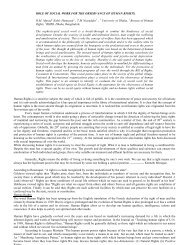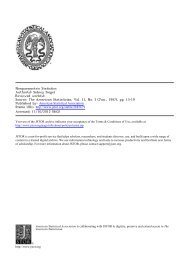Memorial University of Newfoundland Travel – Regents Policy
Memorial University of Newfoundland Travel – Regents Policy
Memorial University of Newfoundland Travel – Regents Policy
You also want an ePaper? Increase the reach of your titles
YUMPU automatically turns print PDFs into web optimized ePapers that Google loves.
<strong>Memorial</strong> <strong>University</strong> <strong>of</strong> <strong>Newfoundland</strong><br />
<strong>Travel</strong> <strong>–</strong> <strong>Regents</strong> <strong>Policy</strong><br />
May 10, 2012<br />
PURPOSE<br />
To provide for the proper control <strong>of</strong> expenses related to approved travel by Board <strong>of</strong> <strong>Regents</strong> members.<br />
Also, to set out the rates and conditions <strong>of</strong> reimbursement for travel expenses incurred on Board <strong>of</strong><br />
<strong>Regents</strong> business.<br />
SCOPE<br />
Board <strong>of</strong> <strong>Regents</strong> members with respect to travel on Board <strong>of</strong> <strong>Regents</strong> business.<br />
DEFINITIONS<br />
Member <strong>–</strong> Member <strong>of</strong> the Board <strong>of</strong> <strong>Regents</strong> <strong>of</strong> <strong>Memorial</strong> <strong>University</strong> <strong>of</strong> <strong>Newfoundland</strong>.<br />
<strong>Travel</strong> service <strong>–</strong> a commercial service that provides travel quotations and bookings such as a travel<br />
agency, airline internet site, or travel internet site.<br />
POLICY<br />
Members are reimbursed for reasonable expenses related to approved travel on Board <strong>of</strong> <strong>Regents</strong><br />
business. When practical, Members are encouraged to consider alternatives to travel using available<br />
technology such as videoconferencing and teleconferencing.<br />
All travel at <strong>University</strong> expense must occur by the most economical mode <strong>of</strong> transportation that is<br />
available and practical, while considering the purpose and the urgency <strong>of</strong> the trip. The shortest direct<br />
route must normally be chosen.<br />
It is the responsibility <strong>of</strong> the Chair <strong>of</strong> the Board <strong>of</strong> <strong>Regents</strong> to ensure that this policy and its related<br />
procedures are properly administered. This responsibility may be delegated.<br />
Members are responsible for familiarity with this policy and its related procedures and adhering to them.<br />
An application for expenses not provided for under this policy must be made to the Board Chair who will<br />
decide in consultation with the Board <strong>of</strong> <strong>Regents</strong> Executive Committee, the Secretary <strong>of</strong> the Board <strong>of</strong><br />
<strong>Regents</strong>, and in consideration <strong>of</strong> the Board <strong>of</strong> <strong>Regents</strong> operating budget.<br />
GUIDELINES FOR CLAIMABLE EXPENSES<br />
1. Vouchers<br />
a. Vouchers are pro<strong>of</strong> <strong>of</strong> the disbursement <strong>of</strong> cash and must be submitted with all travel claims, except<br />
where otherwise stated.<br />
b.Vouchers must be current originals and must relate directly to the claim with which they are submitted.<br />
c. Vouchers should be on a payee's bill head or receipt form; should be prepared by the payee; and<br />
should show the payee's address, the date <strong>of</strong> the receipt, the purpose <strong>of</strong> the charge, and the vendor's<br />
GST registration number. In most cases, vouchers will also contain a cash register impression.<br />
2. Credit Cards<br />
a. Credit card receipts are accepted as vouchers for the purchase <strong>of</strong> gasoline and taxi services only. In<br />
these cases, the credit card receipt must state that the purchase is for gasoline or taxi service, with the<br />
name <strong>of</strong> the company clearly displayed.<br />
Page 1 <strong>of</strong> 5
. Credit card service and interest charges incurred by a Member who uses his or her card in lieu <strong>of</strong> cash<br />
are not claimable expenses.<br />
c. When credit cards are used, it is still necessary to submit with the travel claim an acceptable voucher<br />
as defined above.<br />
3. <strong>Travel</strong>er’s Cheques<br />
Appropriate receipts are required to cover the cost <strong>of</strong> obtaining traveler’s cheques which is a claimable<br />
expense whenever the expenses <strong>of</strong> a trip exceed $100.<br />
4. Foreign Exchange<br />
a. Costs for conversion <strong>of</strong> Canadian funds to and from foreign currencies will be reimbursed when<br />
supported by receipts.<br />
b. When translating expenses paid in foreign currencies, the rate to be used should be as follows:<br />
For cash payments, the rate paid when the foreign currency was purchased.<br />
For credit card purchases, the rate used by the bank to convert the purchase to Canadian dollars.<br />
When these costs are not supported by receipts, the average Bank <strong>of</strong> Canada nominal currency<br />
exchange rate shall apply. In cases where the Bank <strong>of</strong> Canada does not provide an exchange<br />
rate, an alternate bank rate from an established institution or web-site, as determined by the<br />
<strong>University</strong>, shall be applied. The rate shall be the average <strong>of</strong> the daily nominal rates applicable for<br />
the period <strong>of</strong> travel.<br />
c. Claims submitted in respect to travel outside <strong>of</strong> Canada must specify the exchange rates used in<br />
completing the claim. A credit card statement or a print out <strong>of</strong> the foreign exchange rate from the<br />
approved bank website for the dates <strong>of</strong> travel is required to support the exchange rate used.<br />
5. Meals<br />
a. Expenses for meals are to be paid when they are incurred and are not to be charged to the <strong>University</strong><br />
for future payment. The maximum that may be claimed for meals is specified in the Schedule <strong>of</strong><br />
Reimbursable Expenses .<br />
b. Meal per diems will be paid only for meals not included in a conference or other registration fee.<br />
c. Despite the abovementioned, a Member, when exposed to unusually high meal costs, may be<br />
reimbursed his or her actual expenses for meals based on pro<strong>of</strong> <strong>of</strong> payment to the extent that the<br />
expenses claimed are reasonable and justifiable in the circumstances. If this option is chosen, receipts<br />
must be submitted for the entire trip in lieu <strong>of</strong> per diems. The details shall be briefly documented and<br />
submitted to the Board Chair who will decide in consultation with the Board <strong>of</strong> <strong>Regents</strong> Executive<br />
Committee, the Secretary <strong>of</strong> the Board <strong>of</strong> <strong>Regents</strong>, and in consideration <strong>of</strong> the Board <strong>of</strong> <strong>Regents</strong><br />
operating budget.<br />
d. For Members travelling in excess <strong>of</strong> two consecutive nights an extra amount will be added to the meal<br />
per diem to cover the costs associated with personal telephone calls, laundry, gratuities, dry cleaning,<br />
valet services and other incidentals associated with travel away from home. This amount is specified in<br />
the Schedule <strong>of</strong> Reimbursable Expenses.<br />
6. Transportation - General<br />
a. Unless the nature <strong>of</strong> the trip renders it impossible or imprudent, Members should take advantage <strong>of</strong><br />
any special discounts available.<br />
Page 2 <strong>of</strong> 5
. Members will be reimbursed for expenses relevant to <strong>University</strong> business. If Members interrupt or<br />
extend their travel to accommodate non-<strong>University</strong> business, a quote for the expenses related to the<br />
<strong>University</strong> business portion must be provided.<br />
c. Service fees charged by a travel service are reimbursable.<br />
7. Transportation - Air<br />
a. Except when another mode <strong>of</strong> travel is practical and more economical, air travel is the accepted normal<br />
mode <strong>of</strong> transportation for <strong>University</strong> business.<br />
b. All air travel on scheduled flights should be made at the lowest obtainable cost and, in any event,<br />
should not exceed full economy or tourist-class fare. Business class (or equivalent) may be authorized<br />
when, in the opinion <strong>of</strong> the Board Chair, the cost is justified and funds are available in the Board <strong>of</strong><br />
<strong>Regents</strong> operating budget.<br />
c. Normally, air travel arrangements are made by the Office <strong>of</strong> the Board <strong>of</strong> <strong>Regents</strong> through the<br />
<strong>University</strong>’s authorized travel agency(ies). In these cases, boarding passes are not required to be<br />
submitted. When air travel is paid by the Member, requests for reimbursement will include the<br />
invoice/itinerary, identifying the type <strong>of</strong> seat sale and all applicable taxes. Boarding passes for each flight<br />
segment must be included with the Member’s travel claim.<br />
d. If a Member chooses not to travel by air, and air travel is the most economical and practical mode for<br />
the trip, the <strong>University</strong> will reimburse the actual cost <strong>of</strong> travel, not mileage, based on a direct routing to the<br />
destination. The total cost cannot exceed the cost <strong>of</strong> a 14 day advance airfare as confirmed by a valid<br />
written quotation from a recognized travel service. This quotation must be obtained prior to travel and<br />
must be submitted with the travel claim. Original vouchers covering traveling expenses (i.e., gas receipts,<br />
hotel bills, ferry charges and meals using per diem rate) must be submitted on a travel claim.<br />
Reimbursement for travel within <strong>Newfoundland</strong> and Labrador will be per kilometer allowance based on a<br />
direct routing to destination. Refer to Schedule <strong>of</strong> Reimbursable Expenses for current mileage rate.<br />
e. The Member is responsible for recovering funds for unused portions <strong>of</strong> airline tickets.<br />
f. Expenditures for travel insurance will not be allowed except insurance against forfeiture <strong>of</strong> ticket cost<br />
because <strong>of</strong> trip cancellation.<br />
8. Transportation - Rail<br />
Where travel by rail is authorized, the Member will be reimbursed for the cost <strong>of</strong> first class<br />
accommodations where overnight travel is involved.<br />
9. Transportation - Sea<br />
a. Because <strong>of</strong> the time and cost, travel by sea is not normally authorized. However, where this mode <strong>of</strong><br />
travel is necessary, the Member will be reimbursed the cost <strong>of</strong> first class accommodations.<br />
b. When ferry travel is authorized, transportation <strong>of</strong> a vehicle necessary to the travel will be permitted.<br />
c. Proper receipts are required for all types <strong>of</strong> sea travel and should be attached to the Member's travel<br />
claim.<br />
10. Transportation - Taxi<br />
a. A taxi may be used when justifiable and reasonable, and when it is the most economical means <strong>of</strong><br />
transportation under the circumstances. Vouchers are required for all taxi expenses in excess <strong>of</strong> $5.00.<br />
b. The starting point and destination <strong>of</strong> a taxi trip must be stated on the travel claim.<br />
Page 3 <strong>of</strong> 5
c. Whenever a taxi is hired for travel other than within an urban area, care must be exercised to ensure<br />
that the rate is not excessive for the distance to be travelled and that it is the most economical mode <strong>of</strong><br />
travel available. Where possible, public transportation should be used.<br />
d. When a taxi has been hired contrary to these provisions, the claim will be reduced to an amount equal<br />
to the cost <strong>of</strong> travelling the same route by the most economical and practical means.<br />
e. For transportation to or from an airport or other terminal, the most economical form <strong>of</strong> transportation<br />
available should be used whenever possible.<br />
f. Reimbursement for travel above will be made for parking fees and mileage where the total does not<br />
exceed the standard limousine or taxi fare to and from the airport or drop-<strong>of</strong>f point <strong>of</strong> a commercial carrier<br />
to a maximum as set out in the Schedule <strong>of</strong> Reimbursable Expenses.<br />
11. Transportation- Private Vehicle<br />
a. <strong>Travel</strong> by private vehicle will be authorized only when this method is economical and practical.<br />
Reimbursement will be at the standard rate per kilometer as outlined in the Schedule <strong>of</strong> Reimbursable<br />
Expenses. The mileage allowance covers all vehicle expenses. Consult with the Office <strong>of</strong> the Board <strong>of</strong><br />
<strong>Regents</strong> for instruction on reporting mileage claims.<br />
b. Charges for bridge, ferry and highway tolls are allowed, but claims may not be made for storage,<br />
gasoline, traffic violations, repairs, towing, etc. Claims for parking will be allowed only when paid parking<br />
lots are the only type available.<br />
c. When a Member chooses to use a private vehicle and more economical modes <strong>of</strong> transportation are<br />
available, reimbursement will be for the actual cost <strong>of</strong> travel, based on a direct routing to destination. The<br />
total reimbursement cannot exceed the cost <strong>of</strong> travel for the most economical mode available. Mileage<br />
will not be reimbursed.<br />
d. Refer to "Transportation- Air” specifically, section 7.d. for more detail about using a private vehicle<br />
instead <strong>of</strong> air travel.<br />
12. Vehicle Rentals<br />
a. Rental <strong>of</strong> vehicles would occur only when it is the most economical means <strong>of</strong> transportation or when it<br />
is justifiable under special circumstances. Written justification must accompany travel claims.<br />
b. <strong>Memorial</strong> <strong>University</strong> carries insurance with respect to losses by Members who rent vehicles on<br />
university business.<br />
i) A photocopy <strong>of</strong> the Member’s driver’s license must be filed with the Office <strong>of</strong> the Board <strong>of</strong> <strong>Regents</strong> prior<br />
to the first rental and refiled every two years.<br />
ii) The Member should decline any insurance <strong>of</strong>fered by or through the rental agency.<br />
iii) Receipts must be obtained for all vehicles rentals.<br />
iv) The rental agreement must be written in the name <strong>of</strong> “<strong>Memorial</strong> <strong>University</strong> <strong>of</strong> <strong>Newfoundland</strong>”. In cases<br />
where the rental agency requires the driver’s name to appear on rental agreement, the agreement should<br />
reference <strong>Memorial</strong> <strong>University</strong> as well.<br />
v) Members should consult with the Office <strong>of</strong> the Board <strong>of</strong> <strong>Regents</strong> prior to making rental arrangements.<br />
Page 4 <strong>of</strong> 5
c. For travel outside <strong>of</strong> Canada and the United States, vehicle rental is not recommended and requires<br />
the approval <strong>of</strong> the Board Chair. Consult with the Office <strong>of</strong> the Board <strong>of</strong> <strong>Regents</strong>.<br />
13. Telephone<br />
Reimbursement <strong>of</strong> telephone costs may be requested if the calls were related to <strong>University</strong> business.<br />
When such claims are made, the person to whom the calls were made must be noted with a brief<br />
explanation on the travel claim form.<br />
14. International <strong>Travel</strong><br />
When a Member is required to travel abroad, the necessary documentation such as visa, inoculations,<br />
vaccinations, x-rays and health clearance certification will be reimbursed. However, passports are<br />
considered a personal item and must be obtained at the cost <strong>of</strong> the Member.<br />
15. Excess Luggage<br />
A Member may be reimbursed costs incurred in transporting personal effects at excess luggage rates<br />
only if specifically approved and when it can be demonstrated that it was necessary for the effects to be<br />
taken on the trip.<br />
16. Loss <strong>of</strong> or Damage to Baggage<br />
Claims for loss <strong>of</strong> personal effects or damages to personal effects are the responsibility <strong>of</strong> the Member<br />
and should be made to the carrier.<br />
17. Medical<br />
Members are endorsed under the <strong>University</strong>’s travel health insurance plan. In the event <strong>of</strong> a claim, any<br />
individual or group coverage the Member may have would be the first payer.<br />
18. Sundry<br />
No expenditure on the travel claim designated as "sundry," "miscellaneous," etc., will be permitted.<br />
19. Overnight Accommodations<br />
a. Accommodation expenses normally will be paid by the Member and included on the travel claim for<br />
reimbursement. In some situations, the accommodation will be arranged by and paid through the Office <strong>of</strong><br />
the Board <strong>of</strong> <strong>Regents</strong>.<br />
b. Accommodation expenses will be reimbursed, if necessary, to a maximum period beginning with the<br />
night before the date on which the <strong>University</strong> related business begins up to and including the night <strong>of</strong> the<br />
date on which the <strong>University</strong> related business concludes.<br />
c. Accommodation charges related to additional occupancy <strong>of</strong> a room will not be reimbursed.<br />
d. Hotels: The type, standard, and cost <strong>of</strong> accommodation should not be in excess <strong>of</strong> the minimum rate<br />
for a single room in a commercial establishment <strong>of</strong> reasonable class. Approval will not be given for<br />
accommodation at obviously high rates except when a satisfactory explanation is provided. The CAUBO<br />
Canadian "<strong>University</strong>" Hotel Rate Program provides hotel reservation telephone numbers and rates that<br />
should be used wherever possible. Members should also request government rates. In any case, the<br />
lowest possible rate should be obtained.<br />
e. Private: A Member may make arrangements for private overnight accommodation with the appropriate<br />
approvals. Such arrangements will be reimbursed at the standard rate for "Private Overnight<br />
Accommodation." See Schedule <strong>of</strong> Reimbursable Expenses.<br />
APPROVAL DATE: May 10, 2012<br />
Page 5 <strong>of</strong> 5


